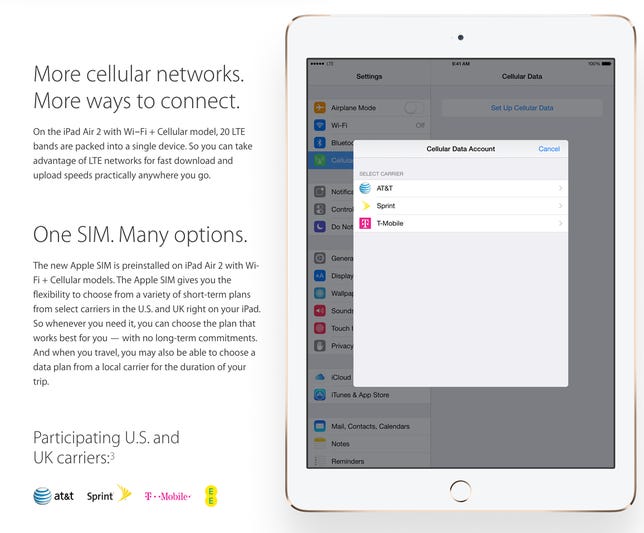
Apple
Apple’s new iPad tablets come with a handy feature that makes switching data carriers a breeze.
The cellular models of the iPad Air 2 and iPad Mini 3 include the new “Apple SIM,” which allows US and UK users to “choose from a variety of short-term plans” from different carriers and avoid longer-term contracts in the process. This looks to be a change from older iPads, which require buyers to pick their carriers at the time of purchase and to physically swap out SIM cards if they switch to a different carrier.
Also, when traveling, users can pick a short-term data plan from a local carrier through the Apple SIM, instead of getting a separate international SIM.
Hands-on with the new Apple iPad Air 2 and iPad Mini 3 (pictures)






The new Apple SIM was mentioned deep in marketing pages for the two new devices. Apple made no mention of the SIM at its launch event Thursday, held at its Cupertino, Calif., headquarters, so details on the feature are still lacking. But, at first glance, the capabilities of such a universal SIM card could bring about big changes in the wireless world, especially if it ever makes it into Apple’s iPhone smartphone. The latest iPhone 6 utilizes a nano-SIM card supplied by a carrier, not an Apple SIM.
Related stories
- Apple fields iPad Air 2 to breathe new life into tablet sales
- When and where to buy the iPad Air 2 and iPad Mini 3
- Apple, needing a jolt with new iPads, plays it safe instead
- The iPad secret Apple didn’t announce today
Participating US carriers with the Apple SIM are AT&T, Sprint and T-Mobile — with Verizon notably absent. In the UK, the carrier EE is listed.
An Apple representative wasn’t immediately available for comment.
The iPad Air
2 is 18 percent thinner than last year’s model and gains the Touch ID fingerprint sensor. It has a gapless new Retina Display with an antireflective coating and incorporates a new, faster A8X chip. There’s a new 8-megapixel camera, as well, that now supports burst shooting, time lapse and slow-motion. The iPad Mini
3 got the addition of Touch ID and a new gold version.
The iPad tablets are the second-biggest moneymakers for Apple, providing 15 to 20 percent of revenue. The devices are an important way for the tech giant to differentiate its line away from the hugely popular iPhone, though the iPad has posted two quarters in a row of declining shipments and sales.




